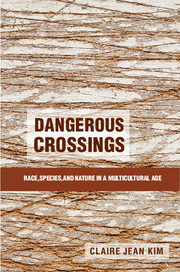Book contents
- Frontmatter
- Dedication
- Contents
- List of Figures and Tables
- Acknowledgments
- Part I Taxonomies of Power
- Part II The Battle over Live Animal Markets in San Francisco’s Chinatown
- 3 The Optic of Cruelty
- 4 The Optic of Racism
- 5 The Optic of Ecological Harm
- 6 Vision/Critique/Avowal
- Part III Other Disputes
- Part IV Conclusion
- References
- Index
3 - The Optic of Cruelty
Challenging Chinatown’s Live Animal Markets
Published online by Cambridge University Press: 05 April 2015
- Frontmatter
- Dedication
- Contents
- List of Figures and Tables
- Acknowledgments
- Part I Taxonomies of Power
- Part II The Battle over Live Animal Markets in San Francisco’s Chinatown
- 3 The Optic of Cruelty
- 4 The Optic of Racism
- 5 The Optic of Ecological Harm
- 6 Vision/Critique/Avowal
- Part III Other Disputes
- Part IV Conclusion
- References
- Index
Summary
The issue is not culture but a degrading human tradition, from Ming Lee to KFC, that ... needs to be changed.
– United Poultry ConcernsAnimal advocates in San Francisco have challenged the way Chinatown’s live animal vendors keep and kill animals, arguing that cruelty is something “you know when you see it.” Positing the prohibition against cruelty as a universal value and appealing to a least common denominator of public belief are strategies that date back at least to the American Society for the Prevention of Cruelty to Animals in the 1830s, the first organized animal advocacy group to emerge in the United States. What becomes clear in the course of struggle in San Francisco is the difficulty of reaching a legally and politically actionable consensus on what constitutes cruelty toward animals, in large part because there is little formal institutional acknowledgment of the notion that animals are morally considerable at all. The argument from the universal, in any case, promptly triggered a counterargument from the particular, as Chinese American business advocates and community leaders claimed that they were being targeted because they are racially different. The optic of cruelty foregrounds animal suffering and backgrounds questions of racism, and the optic of racism (discussed in the next chapter) does the reverse.
In this chapter, I begin with a brief discussion of what Americans make of animals, animal usage, and animal activists at the turn of the millennium. I then turn to the Chinatown live animal market campaign and trace its development from approximately 1995 to 2006, paying particular attention to how the optic of cruelty was articulated and deployed and to what effect. By looking closely at the origins of the campaign, we can evaluate the charge made by many Chinese American activists that the campaign was racially motivated. The overall narrative of the campaign also speaks to the complications involved in advocating for “lesser” animals like birds, fish, turtles, and frogs; the dynamics of cooperation and conflict among animal advocacy groups; and the challenges of negotiating the institutional terrain of San Francisco politics. Unlikely and hard-fought victories are won again and again by animal advocates in different venues, but a confluence of political and institutional factors ensures that little changes in the actual lives of animals as a result.
- Type
- Chapter
- Information
- Dangerous CrossingsRace, Species, and Nature in a Multicultural Age, pp. 63 - 100Publisher: Cambridge University PressPrint publication year: 2015



